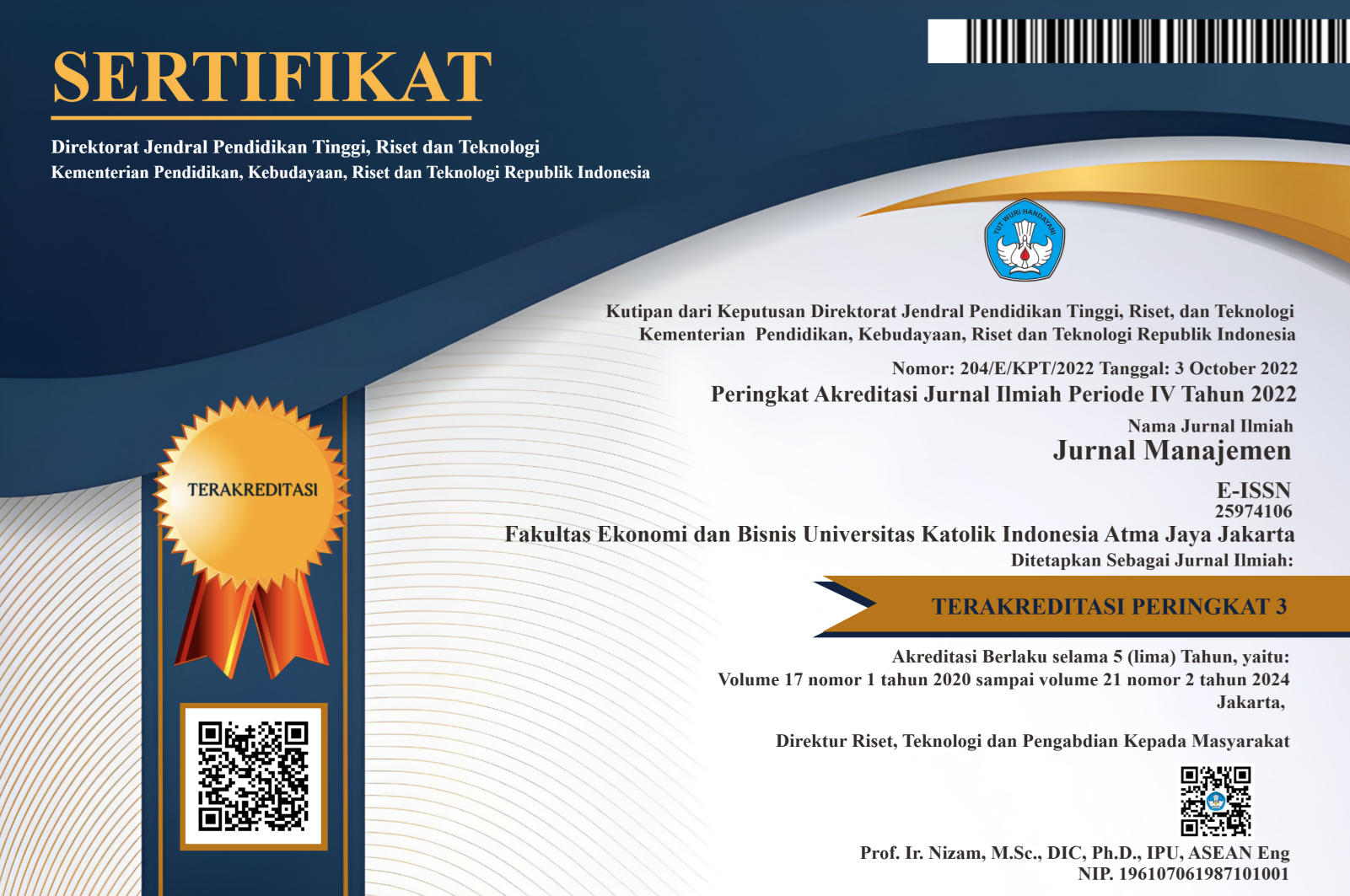PENGARUH INTEGRASI PEMASOK, INTEGRASI INTERNAL, INTEGRASI PELANGGAN TERHADAP KINERJA RANTAI PASOKAN YANG DIMODERASI OLEH KETIDAKPASTIAN PERMINTAAN PADA PT X
DOI:
https://doi.org/10.25170/jm.v16i2.921Keywords:
Customer Integration, Demand Uncertainty, Internal Integration, Supplier Integration, Supply Chain PerformanceAbstract
The purpose of this study is to determine the impact of the supplier, internal, and customer integration on supply chain performance moderated by the demand uncertainty at PT X. This study uses quantitative research methods with data collection techniques using questionnaires with a sample number of 38 using saturated sampling techniques. Data analysis with SEM-PLS with WarpPLS 6.0 software. The result of this research is supplier integration, which has a direct impact on supply chain performance, and the integration of suppliers and customers that impact supply chain performance, as moderated by uncertainty in demand. The results of this study show that managers need to improve supplier and customer integration to improve supply chain performance.
References
Arora, A., Arora, A.S, & Sivakumar, K. (2016). Relationships among supply chain strategies, organizational performance, and technological and market turbulences. The International Journal of Logistics Management, 27(1), 206–232.
Chavez, R., Yu, W., Gimenez, C., Fynes, B., & Wiengarten, F. (2015). Customer integration and operational performance: The mediating role of information quality. Decision Support Systems, 80, 83–95.
Ding, Y., Lu, D., & Fan, L. (2017). How China’s demand uncertainty moderates the respondence of operational performance to supply chain integration in automotive industry. Cogent Business & Management, 4(1), 1318465.
Ganbold, O., & Matsui, Y. (2017). Impact of environmental uncertainty on supply chain integration. The Journal of Japanese Operations Management and Strategy, 7(1), 37-56.
Hair, J. F., Hult, G. T. M., Ringle, C. M., & Sarstedt, Marko. (2014). A Primer on Partial Least Squares Structural Equation Modeling (PLS-SEM). Los Angeles: Sage.
Huo, B., Qi, Y., Wang, Z., & Zhao, et al., X. (2014). The impact of supply chain integration on firm performance: The moderating role of competitive strategy. Supply Chain Management: An International Journal, 19(4), 369-384.
Huo, B., Ye, Y., & Zhao, X. (2015). The impacts of trust and contracts on opportunism in the 3PL industry: The moderating role of demand uncertainty. International Journal of Production Economics, 170, 160-170.
Jacobs, M. A., Yu, W., & Chavez, R. (2016). The effect of internal communication and employee satisfaction on supply chain integration. International Journal of Production Economics, 171, 60–70.
Kock, N. (2017). WarpPLS User Manual: Version 6.0. Laredo, TX: Script Warp Systems.
Rana, S. M., Osman, A., Bahari, A. B., & Solaiman, M. (2015). Determinats of supply chain performance: a strategic point of VIEW. International Journal of Supply Chain Management, 4(3).
Sekaran, U., & Bougie, R. (2016). Research Methods for Business: A Skill-Building Approach. United Kingdom: John Wiley & Sons Ltd.
Srinivasan, R., & Swink, M. (2015). Leveraging supply chain integration through planning comprehensiveness: An organizational information processing theory perspective. Decision Sciences, 46(5), 823-861.
Stevens, G. C., & Johnson, M. (2016). Integrating the supply chain… 25 years on. International Journal of Physical Distribution & Logistics Management, 46(1), 19-42.
Tian, A. (2018). The impact of supply chain cooperative relationship on performance: a knowledge management perspective. Journal of Service Science and Management, 11, 44–55.
Wu, I.-L., Huang, C.-H., & Hsu, C.-H. (2014). Information sharing and collaborative behaviors in enabling supply chain performance: A social exchange perspective. Int. J. Production Economics, 148, 122.
Yu, W., Jacobs, M. A., Salisbury, W. D., & Enns, H. (2013). The effects of supply chain integration on customer satisfaction and financial performance: An organizational learning perspective. International Journal of Production Economics, 146(1), 346-358.
Zhao, L., Huo, B., Sun, L., & Zhao, X. (2013). The Impact of Supply Chain Risk on Supply Chain Integration and Company Performance: A Global Investigation. Supply Chain Management: An International Journal, 18/2 , 115-131.
Downloads
Published
Issue
Section
License
Authors who publish with this journal agree to the following terms:
Authors retain copyright and grant the journal right of first publication with the work simultaneously licensed under a Creative Commons Attribution-NonCommercial-ShareAlike License that allows others to share the work with an acknowledgement of the work's authorship and initial publication in this journal.
Authors are able to enter into separate, additional contractual arrangements for the non-exclusive distribution of the journal's published version of the work (e.g., post it to an institutional repository or publish it in a book), with an acknowledgement of its initial publication in this journal.
Authors are permitted and encouraged to post their work online (e.g., in institutional repositories or on their website) prior to and during the submission process, as it can lead to productive exchanges, as well as earlier and greater citation of published work (See the Effect of Open Access).












